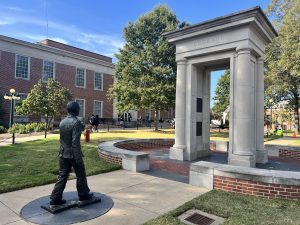
When James Meredith became the first Black student to attend the University of Mississippi in 1962, he was flooded with hundreds of letters from around the world, both supporting and opposing his admission.
Meredith has since donated some of these letters to the university. For the past three years, UM’s Department of Archives and Special Collections has worked to digitize them through Dear Mr. Meredith, a university-wide transcription project. Digital Initiatives Librarian and Assistant Professor Abigail Norris and Digital Humanities and Data Visualization Librarian and Assistant Professor Adam Clemons helm the effort in collaboration with students and faculty.
“Dear Mr. Meredith is a geospatial humanities project that Adam and I have been working on for the last three years that basically maps out the letters that were sent to Meredith during his attempts to integrate the university and where those letters were sent from,” Norris said.
Along with mapping the origins of the letters sent to Meredith, students transcribed the letters themselves at “transcribe-a-thons,” which were held on Feb. 9, March 9 and April 13, with more events scheduled this semester.
Transcribers could also submit their transcriptions digitally. Transcribers picked a letter, either pro- or anti-integration, and typed out the letters they received word for word so that the letters would be accessible to visually impaired readers who utilized a machine reader.
“The future goal is to go beyond the mapping and take kind of a deeper dive into the sentiment of the letters, and one way to do that would be to have the trend transcriptions available,” Clemons said. “The best way to do that we think is through crowdsourcing, because there are about 1,400 letters out there. So doing that, just the two of us, obviously would be a very huge undertaking.”
Junior elementary education major Lauren Green shared her experience transcribing letters at a Dear Mr. Meredith transcribe-a-thon event in April.
“Our teacher gave us extra credit on an assignment for transcribing the letter. I enjoyed the experience, though. It was cool to see a new perspective on the situation from a first-hand letter during that time,” Green said. “I remember in my letter, she told (Meredith) to keep fighting for what was right, and that stood out to me.”
The overall goal of the Dear Mr. Meredith is to have a digital gallery of Meredith documents so students are able to interact with the history of integration at the University of Mississippi.
“We are building a digital exhibit using this program called ArcGIS story maps,” Norris said. “The idea is that people would be able to either go to the website or use one of the new touch screen TVs that we have in the library to actually go and interact with the map and click on the little dot that indicates a letter and be able to read the letter and see what it says.”
Along with creating a digital exhibit for anyone on campus to experience, Norris and Clemons aim for this project to provide specific subject matter relating to how UM’s integration plays into American history and potentially to grow into a university course.
“I, at some point, hope to teach. We’re doing digital humanities workshops in the library, and our goal is to offer a for-credit course associated with various methodologies,” Clemons said. “This would certainly be one component or a section of such a course. I would also like to see this offered as a unit in a civil rights history course or American history course.”
For anyone hoping to get involved with the Dear Mr. Meredith, upcoming transcribe-a-thon events will take place on Oct. 12 from 2 p.m. to 4 p.m. and on Nov. 9 from 12 p.m. to 2 p.m. in the J.D. Williams Library Classroom 106 D.
Example letters to Meredith can be found on the James Meredith Collection website.



























